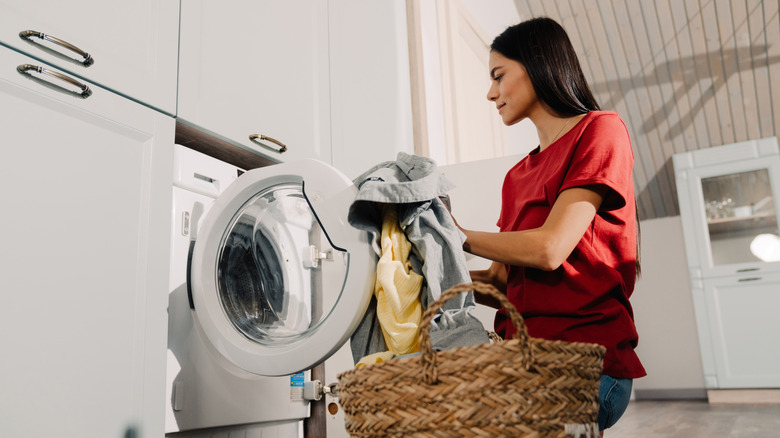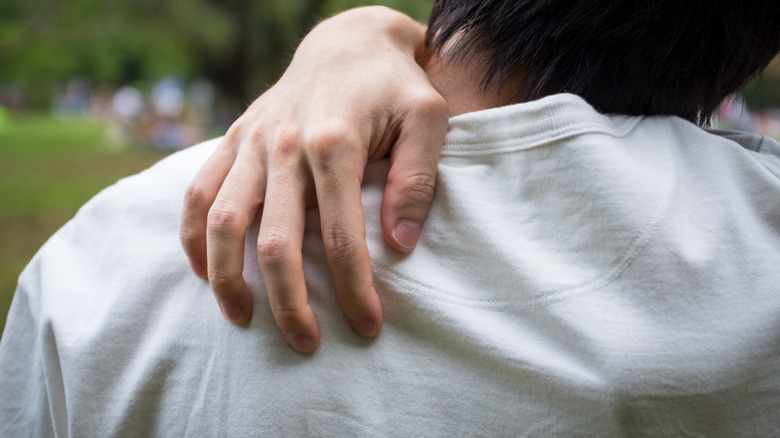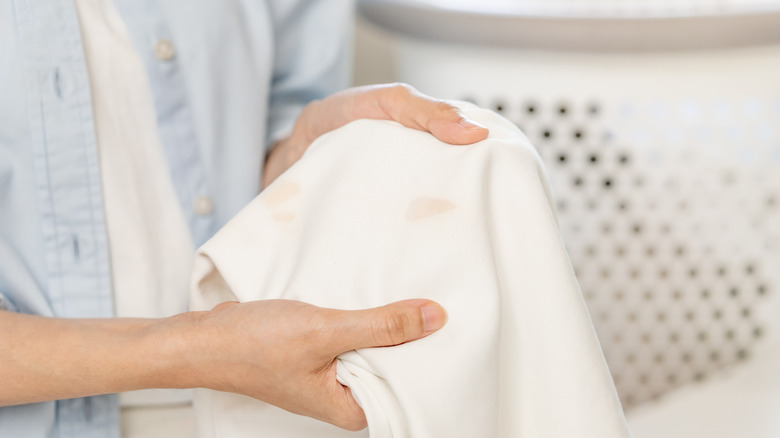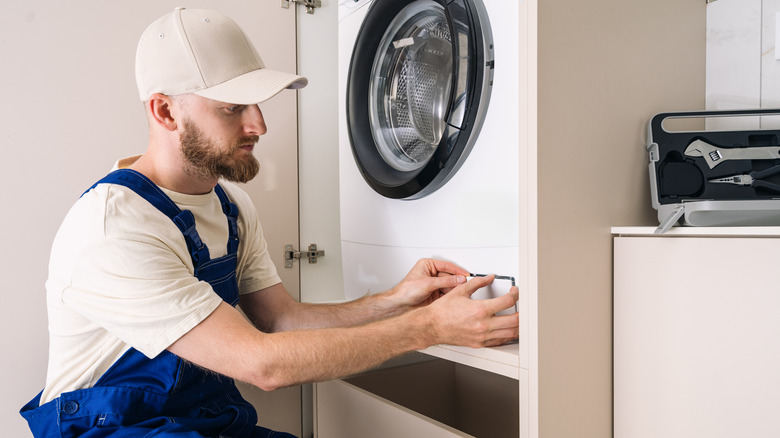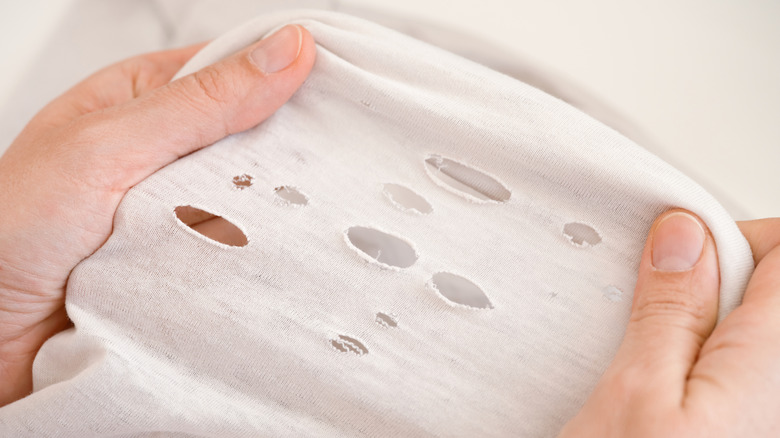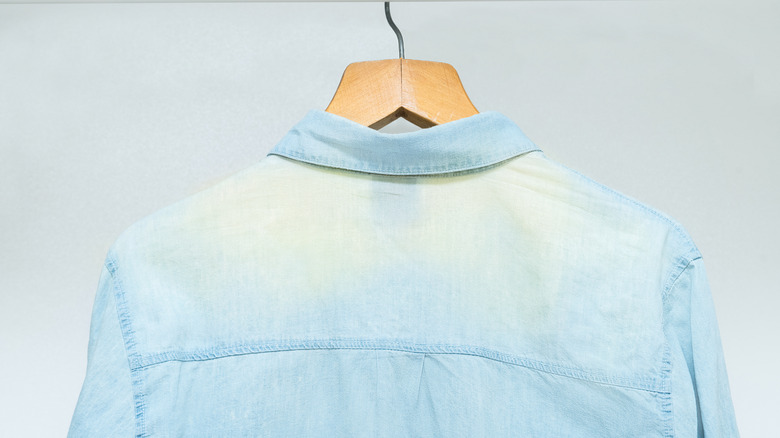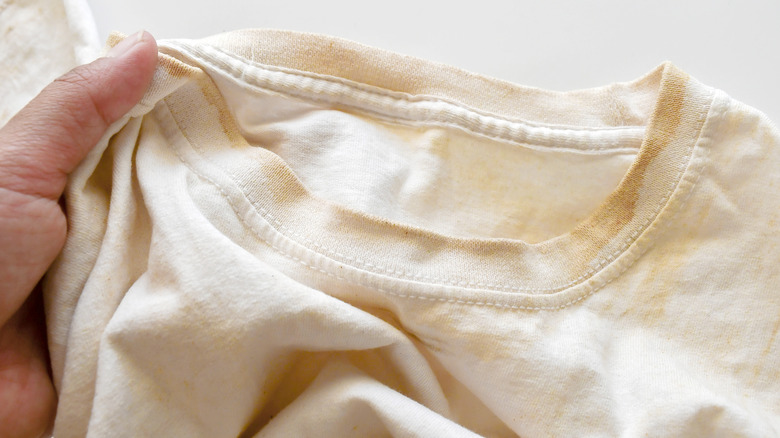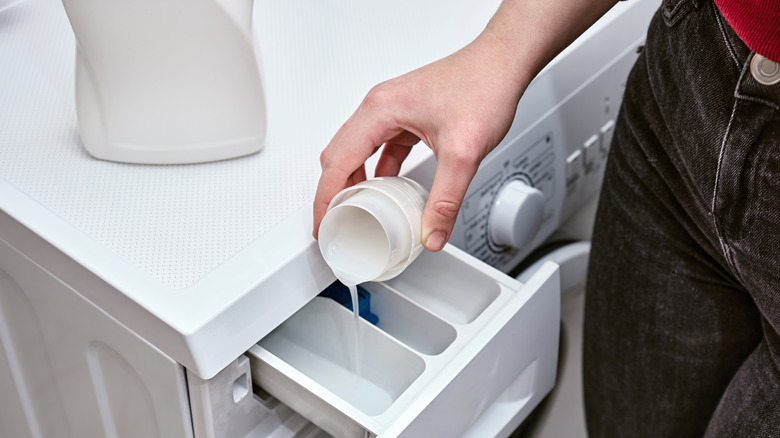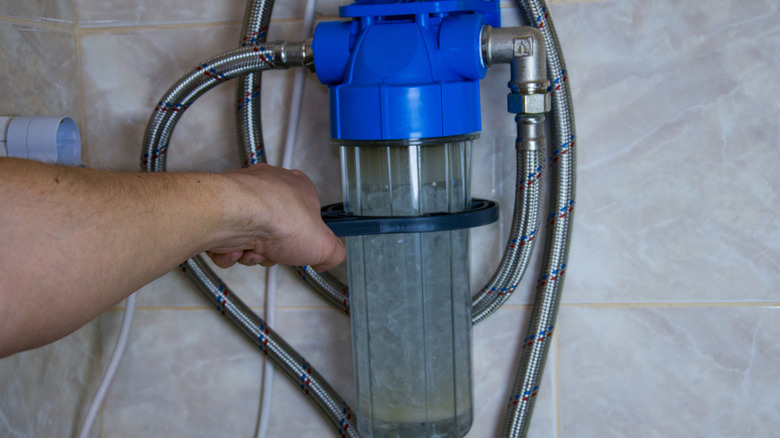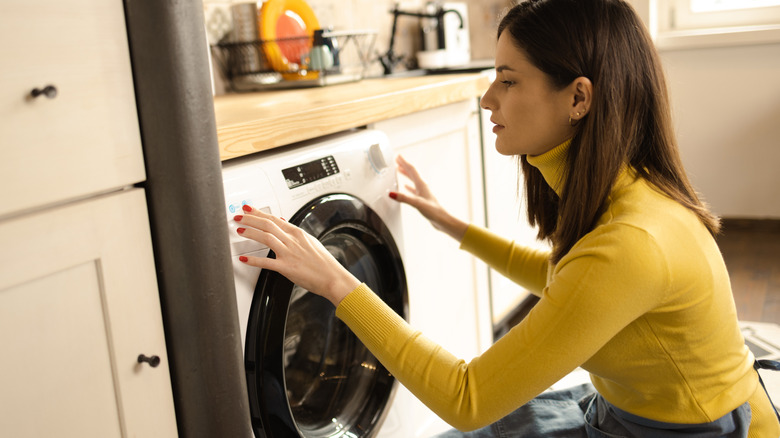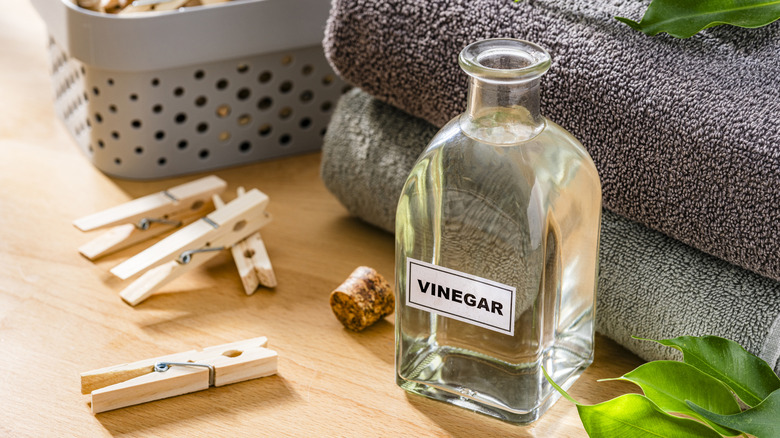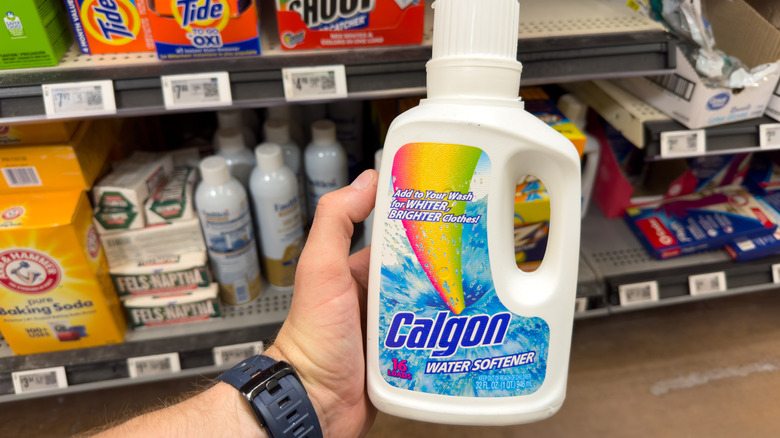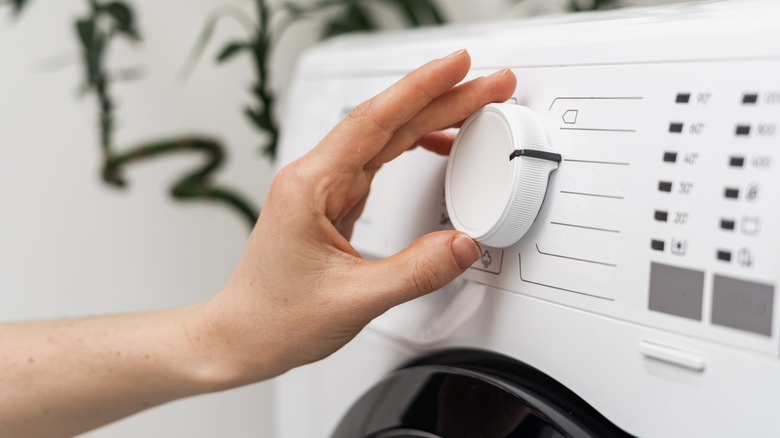7 Signs Hard Water Is Damaging Your Laundry (And Simple Solutions)
Many households struggle with having hard water, and noticing changes in your clothing after it comes out of the wash could signal that the mineral-filled water is starting to harm your laundry. Magnesium and calcium are often the culprits behind harder water, but other minerals, such as manganese, can also contribute to water hardness. Unfortunately, the more of these minerals that are present in the water, the harder it will be and the more damage it could do to your fabrics in the wash. Hard water will affect the color and feel of your clothes and may make them wear out faster than they should, but these are just some of the horrors that hard water can cause in your home.
While hard water may damage your clothing, linens, and towels while you're trying to clean them, it can also have a negative impact on your washing machine and other parts of your home. The minerals in hard water leave behind deposits and buildup that can cause clogs in your plumbing and harm appliances that use water. Paying attention to your laundry and any changes in the fabrics could let you know if you need to do something about the hard water in your home to protect your clothes and appliances from damage.
A scratchy or stiff texture to your fabrics could signal hard water damage
If you've noticed that your freshly laundered clothes aren't as soft as they used to be or are becoming stiffer, hard water could be causing harm to your fabrics. As your laundry is washed in hard water, the minerals leave behind deposits that will continue to build up over time. Not only will this change the feel and texture of your linens, towels, and clothes, but it is also a sign that the fibers of the fabric are being damaged by the hard water.
Laundry that is repeatedly washed in hard water will lose its texture and may be uncomfortable to wear. This is an indication that your towels and clothes are being worn out by your hard water. The mineral particles stuck inside the fabric begin to scratch against the fibers of the material, which makes your clothes wear out faster. Towels that are often washed in hard water may lose their ability to absorb water as well as they once could. If you notice stiff clothes, scratchy linens, and ineffective towels, it's time to think about solutions for solving your hard water problem.
Hard water can leave a filmy residue and pesky streaks on your clothes
Pulling your clothes out of the laundry only to discover that they're coated in a white residue or covered in gray streaks is alarming, and it's a clear sign that you're dealing with hard water. The residue could be a filmy layer over your fabrics, or, on colored clothing, you might notice streaks or patches of hard water residue that are extremely difficult to remove. The abundance of minerals in the hard water makes it more difficult for your laundry detergent to work properly, which allows the film to stick to your clothing and towels rather than being washed away.
In some cases, the hard water minerals and residue will mix together with your laundry soap, creating soap curd. This curd will also get all over your fabrics and needs to be cleaned, and could be somewhat responsible for the white film on your clothes. While hard water probably won't have this effect on your fabrics after one wash, the minerals will slowly start to harm your clothes with time. If pesky hard water residue and streaks are already on your laundry, you can try stripping it to remove the minerals and make your clothes look and feel better again.
Clothes that come out of the wash still smelly are a sign of hard water
If you keep washing your laundry, but it's continually coming out of the wash smelling bad, hard water could be responsible. The reason your clothes still smell after washing them is that the minerals in hard water make it harder for your detergent to cleanse effectively. Additionally, the soap scum or soap curds that result from hard water mixing with your laundry detergent can also cause your fabrics to develop an unpleasant odor. Unfortunately, your stinky laundry could be slowly getting damaged by being washed in hard water.
A 2016 study confirmed that harder water reduces the cleansing power of detergent, leaving behind dirt. This could be partially because hard water affects the detergent's alkalinity, preventing it from getting your laundry clean. Some of the soap's components that should be cleaning your clothes end up softening the hard water you're washing with instead, leaving grime on your laundry. Since your fabrics aren't truly being cleaned, this could be contributing to laundry odors.
Clogs in your washing machine might be caused by hard water deposits
Washing machines are one of several home appliances that can be seriously damaged by hard water, and if you start noticing signs of damage with your clothing, you might want to check on your washer, too. The same mineral deposits that cling to your fabrics washed in hard water will also start accumulating inside your washing machine. In some cases, your washer may need to work extra hard to run properly, but hard water can also create more serious issues. With time and the continual buildup of minerals in your washer, clogs could form in the appliance or its pipes.
The limescale deposits building up in your washing machine will likely cause it to need more frequent repairs and affect its ability to clean your laundry efficiently. Unfortunately, damage from hard water can also significantly impact the lifespan of your washer. This is why it's so important to address issues with minerals in your laundry quickly and save your clothes and appliances from hard water damage.
Your clothes seemingly wearing out faster than normal signals excess minerals
As your linens, towels, and clothing are washed in hard water over and over again, the materials they're made of will start to become weaker. You may notice tearing or fraying occurring in your fabrics quickly, showing that hard water has already begun to seriously damage your laundry. Not only will the minerals in hard water contribute to stiffness, scratchiness, and residues on your fabrics, but they will also weaken the fibers extensively over time. Eventually, the mineral deposits will end up ruining your favorite shirts, pants, and other articles of clothing.
Once the mineral particles are stuck in the fabric, their stiffness can create friction. As the material moves around, the minerals rub the fabric more and cause it to wear out quickly. Clothes and other fabrics that are washed in hard water were found to wear out 15% faster than those cleaned in soft water, according to a University of Idaho study. Though hard water has already done its damage to your ripped and fraying fabrics, you can protect the rest of your clothes by addressing the minerals in your water.
Vibrant colors fading to dull hues in the wash indicates hard water
Discovering that your brightly colored fabrics have started to look dull is super disappointing, though it can let you know that hard water is damaging your laundry. If your clothes start to look more and more faded with every wash, hard water minerals are probably affecting the color. This often goes hand in hand with the residue left behind by hard water, and eventually the damage could worsen to rips and tears.
As your clothes and towels continually come into contact with hard water in the wash, the minerals can also start to strip away the dyes in the fabric, leaving you with faded, less vibrant laundry. To keep your clothes bright and free from harm, you'll need to soften your water. Sadly, you won't be able to bring back the color to fabrics that are already dull and faded, but now that you're aware of your hard water issues, you could try to prevent further damage.
Your whites may not stay as bright when washed in hard water
Just like how the minerals in hard water can affect your colorful clothes, it can also change the hue of white fabrics. Whether you have pristine white towels or a beautiful white piece of clothing, your lighter laundry may start to look dingy or gray when washed continually in hard water. If you want to keep your whites vibrant and bright for longer, washing them in hard water won't do you any favors.
The graying of white fabrics when washed in hard water could be partially due to the fact that the mineral-filled water prevents your detergent from washing properly. This leaves behind dirt and grime, which causes your clothes to appear dingy. If you notice that your white t-shirts have worsening yellow marks under the arms despite your best efforts to wash the garments and treat the stains, hard water might be the culprit behind this issue as well.
Using more detergent could be a temporary solution against hard water
Hard water lessens the cleaning power of your laundry detergent, but using a bit more of it could help your clothes get clean. A lot of the detergent used in the wash with hard water will end up softening the water rather than cleaning your clothes. By adding extra detergent to your loads of laundry, you'll ensure there's enough soap to wash your clothes after it softens the water. This is only a short-term solution to remove the dirt from clothes when washing in mineral-filled water; using additional detergent won't solve your home's hard water problem.
If you're pouring extra detergent into your washer and your clothes still don't seem clean, you might want to opt for a higher-quality laundry soap that is designed to work against mineral buildup. While using a little more detergent can help to mitigate some of these hard water issues, you could end up spending a lot more on soap.
Add a water softener to protect your laundry from hard water minerals
Installing a water softening system in your home is the simplest solution for preventing hard water buildup. Water softeners filter your home's water to remove the minerals that make it hard, preventing damage to your laundry and appliances. Many softeners replace the minerals in your water with sodium, though some use potassium, to eliminate the hardness and make the water easier on your fabrics. This is done through a cation exchange, where the mineral ions are swapped for sodium ions or potassium ions.
Though water softening systems will cost money to install and maintain — the salts will be used up and need to be replaced over time — they could help save your laundry from hard water damage. Plus, hard water ends up costing you extra in laundry detergent, replacing your clothing, washing machine repairs, and additional rinse cycles. If you choose to add a water softener to your home, you'll also need to be mindful that there's extra salt in your water. You may want to avoid watering your plants with softened water, as it can provide too much sodium. If you don't need all of the water in your home softened, consider installing a system for only your hot water or just your laundry hookup.
Using hotter water and longer rinse cycles can combat hard water problems
Not only does hard water make it more difficult for your detergent to get your fabrics clean, but it also tends to have a harder time rinsing your laundry. Using hotter cycles when doing laundry can help your clothes or towels get clean despite the challenges of the calcium and magnesium in your water. If your fabrics can handle being washed in hot water, this could be a good option to ensure they're fresh and clean, though it won't eliminate the minerals.
If hotter water on its own isn't helping your laundry enough and you're finding soap or dirt remaining, try using extra rinse cycles. Since hard water has trouble rinsing efficiently, you may need to use your washer's longest rinse cycle or set a second rinse cycle after the first has finished running. While this method will get your laundry a bit cleaner, you may still end up dealing with mineral residue or faster wear, making hotter rinses a temporary solution. Additionally, using excess hot water could increase your utility bills. If you're concerned about damaging your laundry over time, treating the hard water itself with a softener is a better long-term option.
Vinegar could help to lessen residues on your clothes
With clothes that have already been marred by gray streaks and white film, you can easily remove hard water stains with the help of this kitchen essential. Vinegar is a fantastic tool for a variety of cleaning tasks, and its acidity could help remove those annoying mineral residues. White vinegar that's often used for cleaning contains about 5% acetic acid, which is strong enough to neutralize the minerals from your hard water and eliminate the stains from your clothing. Treating your stained, stiff laundry with a bit of vinegar can also help to bring back the fabric's soft feel after repeated washing in hard water, as this cleanser can also act as a fabric softener.
To treat your clothes or other fabrics with hard water stains and stiffness, try soaking the material in a solution of equal parts water and white vinegar. While it's sometimes recommended to put a cup of vinegar in your load of laundry to counteract the hard water right away and prevent mineral deposits from forming, this isn't always the best choice. The acidity of vinegar may harm some washing machines by corroding their components, especially rubber pieces like the gasket.
Add water conditioners to your washer to combat hard water
While watering softening systems remove the minerals from your hard water by replacing them with sodium or potassium, conditioners will not take the calcium and magnesium out of the water. Instead, water conditioners simply neutralize the minerals or make it harder for them to affect your laundry. Unlike water softeners, which have to be installed and filter your hard water to treat it, conditioners can be added directly to your load of laundry. Though they interact with hard water minerals differently than softening systems, water conditioners can be a great tool for softening the water and helping your clothes get clean without that pesky residue.
Water conditioning products can often be found in regular grocery stores, making them an easily accessible and quick option for protecting your fabrics. These non-precipitating conditioners work by counteracting the hard water minerals and keeping them away from your clothes. To use a water conditioner, add the recommended amount to the water in your washing machine before putting in your detergent. Otherwise, you might treat clothes with hard water damage by letting them soak in your washer with extra detergent and a cup of conditioner.
Be sure to routinely run a washer cleaning cycle
Since hard water can form deposits inside your washing machine over time and eventually cause issues like clogs, it's important to regularly clean your washing machine to avoid buildup. Many newer appliances have a cycle specifically for cleaning the washer. Your washer's cleaning cycle can be used with a descaling product to help prevent hard water from damaging your machine. These cycles use a lot of water compared to your typical washing cycle, and when combined with an efficient cleaner, this will ensure your appliance is as clean as can be.
Some washer manufacturers recommend using vinegar as a natural descaler to clean hard water deposits from your appliance, while others warn against this acidic solution as it may hurt the rubber seals, hoses, or even the drum of the washer. Because of this, it's crucial to check the manual for your specific washer before deciding on a descaler. Commercial products can be helpful in removing mineral buildup and are also commonly recommended by manufacturers. If your washing machine doesn't have a cleaning cycle, you can still use a descaling product with a hot cycle, though you may need an extra rinse cycle afterwards. By keeping up with washer maintenance and regularly cleaning your appliance, you can mitigate the harmful effects of hard water minerals.
